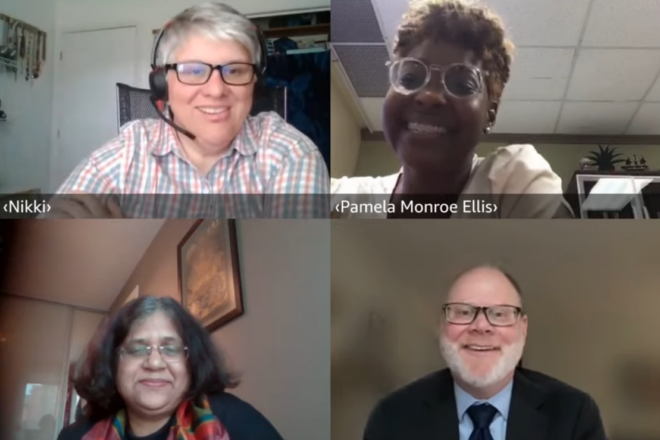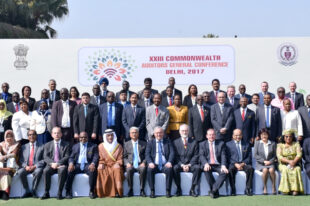On April 7, 2021, the U.S. Government Accountability Office (GAO), the Supreme Audit Institution (SAI) of the United States, held the first in a series of free international webinars to promote knowledge sharing and address emerging issues the INTOSAI community is facing during the pandemic. More information about the webinar series can be found here.
The topic of the first webinar was the challenges and lessons learned in conducting real-time audits of COVID-19 activities. The webinar featured Pamela Monroe Ellis, Auditor General of Jamaica; Nicole Clowers, Managing Director of GAO’s Health Care team; and Archana Shirsat, Deputy Director General at the INTOSAI Development Initiative (IDI). Michael Hix, International Relations Director at GAO, moderated the conversation, which attracted more than 130 attendees.
The panelists underscored the critical role that real-time auditing—i.e., conducting audits at the same time that government entities are implementing programs—plays in providing oversight during crises like the pandemic. With governments undertaking major recovery efforts, SAIs need to be agile and attuned to the rapidly evolving situation. Ms. Monroe Ellis emphasized that it is far less costly to prevent problems than to correct them later; for example, through real-time auditing, SAI Jamaica was able to prevent $245 million in payments to persons not entitled to COVID benefits.
The panelists lauded the diverse actions SAIs have taken to respond to the pandemic, but noted that many SAIs have faced challenges in conducting real-time audits. These challenges include poor quality data, limited technology and staff capacity, and questions related to whether SAIs have the mandate to carry out this kind of oversight.
With more crises sure to come in the future, the panelists urged SAIs to shift into more of a foresight role. They described a number of steps SAIs can take to prepare in advance, so that they are poised to respond effectively when a crisis hits. For example, SAIs can improve their business processes and technology, and ensure their staff have a mix of competencies and skills, including deep program knowledge and strong interpersonal and communications skills. It is also critical that SAIs have the independence necessary to conduct this work.
Some of these steps may be out of reach for SAIs that have limited capacity or face ongoing security challenges. However, Ms. Shirsat emphasized that in times of crisis, SAIs can do impactful, innovative work even within significant constraints. She advised that SAIs reflect on the nature of the work they wish to conduct, break it into manageable pieces, and foster stakeholder coalitions.
Ms. Clowers highlighted the importance of reaching out to stakeholders early when conducting real-time audits. Clearly communicating expectations and priorities helps ensure agencies build accountability and transparency into their programs from the start.
The panelists agreed that knowledge sharing and capacity building is key to helping members of the INTOSAI community prepare for and respond to crises. Ms. Shirsat also described a new IDI initiative that provides support to SAIs as they exercise oversight of COVID-19 activities.






